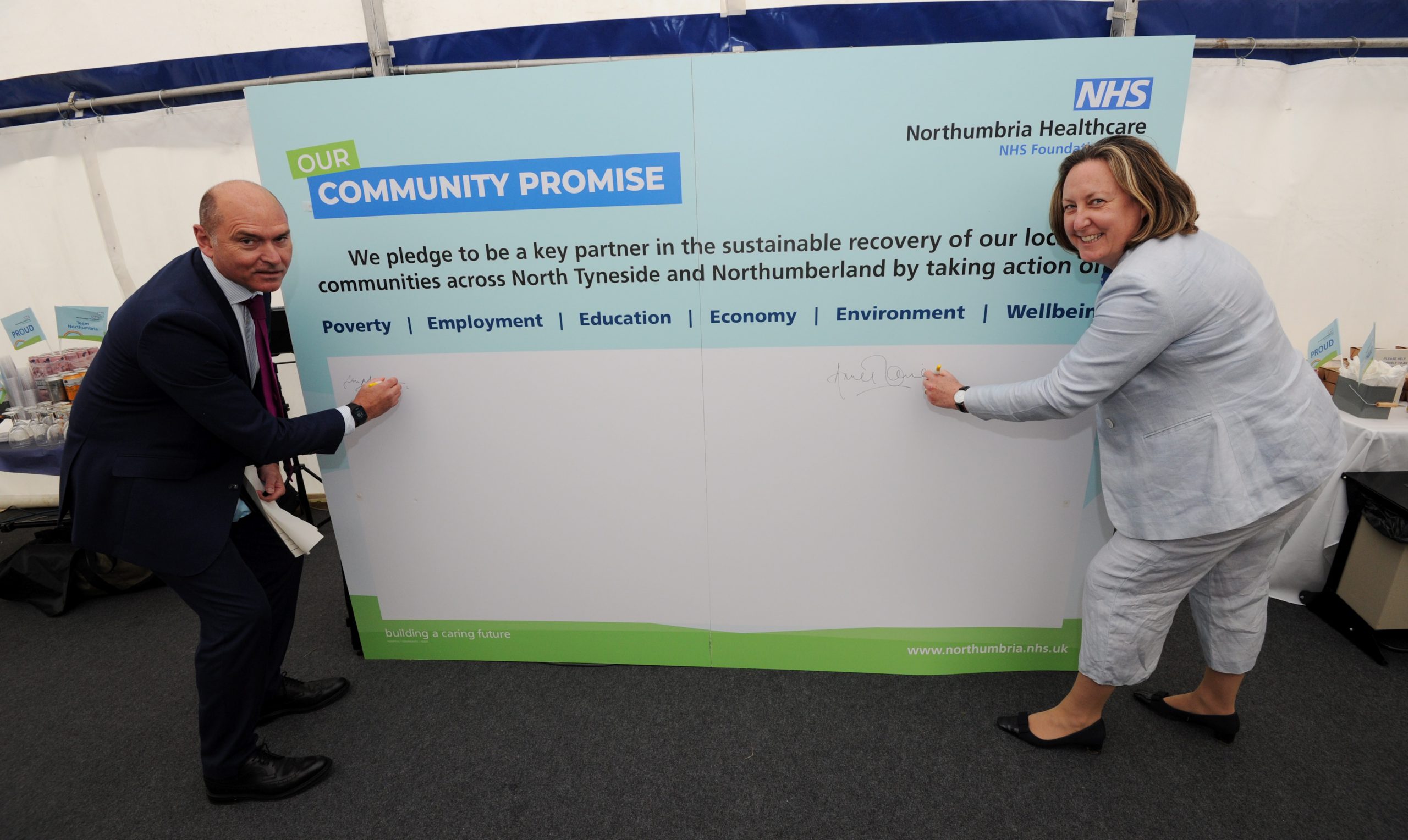Northumbria Healthcare has taken another step to push the boundaries of how NHS organisations can improve people’s lives with the launch of a bold new strategy.
At a special event on Friday, June 25, it became the first NHS trust in the country to make a formal commitment to focus on the full range of ways it can make a difference, in front of key partners and stakeholders from around the region.
The Northumberland launch, which took place outdoors at Berwick Infirmary, was addressed by the area’s MP, Energy Minister Anne-Marie Trevelyan, and Dr Henry Kippin, managing director of the North of Tyne Combined Authority, as well as the Trust’s chief executive, Sir James Mackey.
The hospitals and community services Northumbria Healthcare provides in Northumberland and North Tyneside already play a vital role in supporting and improving the health and wellbeing of residents.
The Trust has been rated outstanding by the Care Quality Commission twice since 2016 and will always strive to be the best in the provision of healthcare, but Our Community Promise details how the organisation can have an even larger impact on the lives of everyone who lives and works in the area and wider region.
Sir James said: “Healthcare is the essence of what we do, with a focus on constantly pushing the boundaries in relation to innovation and improving patient and staff experience, but we are also a major employer, a major buyer and user of products and services, and we are very conscious of our carbon footprint and our responsibility to look after our precious environment.
“As well as knowing we can do more, it is also the case that we should do more and it is our duty do more – to go beyond day-to-day care for patients and tackle the wider factors that affect the happiness and healthiness of our communities. We want to take responsibility for the positive impact we can have as the region – and country – work to recover from the effects from Covid-19.
“The focus of everything we do is about providing the best care for our patients and the direction of travel in healthcare in recent years has been very much about preventing people from becoming patients in the first place, by helping them to live well and healthily for as long as possible.
“We know that there are a range of factors that affect people’s ability to do this, many of which are not part of traditional healthcare operations, but we are certain that we can play a major role in supporting our communities in more ways than many might expect and we are determined to step up to the plate and do just that.”
The issue of health inequalities has long been a concern, with people living in more deprived areas having much higher rates of preventable diseases and much earlier deaths than those in less deprived areas, but the pandemic has been a stark reminder of this divide.
With this in mind, Our Community Promise is based on six key pillars, which relate to the wider factors that fuel health inequalities – poverty, employment, education, economy, environment, wellbeing.
Sir James added: “A number of these schemes build on what we have been doing for some time and our efforts were recognised last year when we became the first health organisation in the UK to receive gold accreditation for corporate social responsibility.
“But we don’t want this to be about buzzwords or airy concepts, so we will set out clearly what our communities can expect from us and how we want to try to support them. Each pillar has a series of tangible and meaningful actions which the Trust will formally commit to, as well as measuring and reporting on the outcomes.
“Our Manufacturing Hub in Seaton Delaval, established at the height of the pandemic, is an example of the direction of travel. It created 60 jobs and 10 apprenticeships at a time when the economy was under severe pressure, it ensured continuity of PPE supply for ourselves and NHS colleagues while at the same time boosting local supply chains.”
Make local, buy local will be the Trust’s mantra going forward with a commitment to using local suppliers and contractors wherever possible, ensuring firms know how they can bid for work. There will be events to make sure that communities are aware of the wide range of job opportunities on offer alongside partnerships with schools to drive aspirations and open up pathways into health and care careers, including through hundreds of work experience placements.
Across the organisation, recent figures show that of the more than 300 staff currently on apprenticeships, more than a third (35%) are aged between 16 and 25, a third are from areas among the top 20% most deprived in England, and a quarter are from rural areas, but there is a target to increase the number of apprentices by 30% over three years.
Environmental sustainability has already been a focus for a number of years, with carbon emissions from energy use down 41% over the past five years, while waste emissions were reduced by 50%. The new facility for sterilising medical equipment on the Northumbria hospital site in Cramlington as well as the new hospital in Berwick will be net-zero developments in terms of carbon emissions.
For a number of years, Northumbria Healthcare has also played a key role in local and regional efforts to focus on public health, inequalities and ensuring the population lives well for longer, with the latest addition to this journey being the creation of the Trust’s health inequalities programme board, chaired by leading public health consultant Jonny Pearson-Stuttard.
Tagged:

